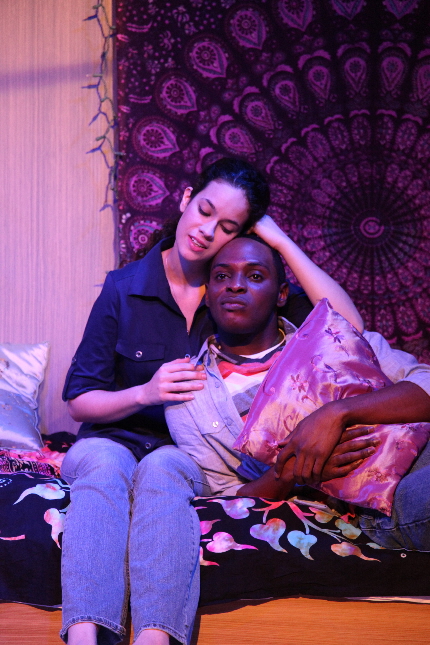
Are Connie Fernandez and Jovon Jacobs lovers, BFFs or something else in Arts Garage’s The Mystery of Love and Sex / Photo by Lloyd’s Photography
The South Florida theater season has ratcheted up into high gear with three, five even six openings in a single week, plus we have advance stories and feature stories coming. We will be posting a new story nearly every day and sometimes twice a day. Therefore, if you don’t see a review of a show that has opened while looking at the top of the front page, please scroll down the page or use the search function. And visit often.
By Bill Hirschman
The intersection, overlap and conflict of love and sex – but above all how they affect relationships — form the basis of Theatre at Arts Garage’s uneven but intriguing entry appropriately entitled The Mystery of Love and Sex with an emphasis on the word Mystery.
With a misleading subtitle “the hit romantic comedy,” this 2015 script by Bathsheba Doran is a strange mélange of television sit-com, topical examination of current issues, character-based humor, heart-filled family drama and several other facets. Its claim to be a detective story is only true in that its characters uncover an unending procession of secrets inside their hearts as they stumble toward discovering their true selves.
Doran introduces Charlotte, a white college student from a suburb of what is probably Atlanta; Jonny, her black friend from childhood; and her studiously open-minded parents, Howard and Lucinda, who expect the young people will marry someday.
We watch as Charlotte and Jonny, as close as they are, haphazardly navigate a maelstrom of confusion about sexual identity – the outstanding element of the script convincingly and movingly executed by Connie Fernandez and Jovon Jacobs under Genie Croft’s direction.
Normally, we would give you a synopsis of the plot which occurs in two acts separated by five years. But it involves onion-layer peeling revelation after revelation that change the audience’s and the characters’ understanding of the present and the past. One character, once sure of the foundation of a relationship, exclaims in frustration, “Are we an illusion?”
The primary arc is how each member of the quartet finally comes to a hard-won sense of completeness and freedom as they learn who they really are.
The script is lathered in copious amounts of 1963 Neil Simon repartee and late 1990s Will & Grace humor, but interrelationships among all four morph as they are buffeted by the secrets that define love and sex.
Thinking about the script the day after the performance, the production grew on this critic who was a bit at sea actually watching it. For instance, the first scene of the parents visiting the young people in Charlotte’s dorm seems like a stilted daffy scene out of Barefoot in the Park, unaware that we are really seeing the young people’s relationship through the parents’ eyes. In fact, we discover in the next scene, bit by bit, that the folks have it all wrong.
But it was tough during the evening to get in tune with Doran’s genre of each scene, only to have her keep changing gears in mid-scene. She doggedly tosses in twist after twist after twist after twist. Everyone has more baggage than the cargo hold of a 747 and sometimes the tone barely skirts a daytime soap opera.
Indeed, the cast has a bit of trouble convincingly downshifting or negotiating the sudden swerves as Doran throws yet one more surprising revelation, then abandoning it as soon as its revealed, such as one character’s infidelity or a relative’s death, and then immediately we’re off again onto something else.
Doran has certainly crammed two or three plays’ worth of themes into this one: passive racism, homophobia, virginity, restrictive religion, complex parent-child relationships, youth suicide, sexless relationships and a half-dozen other ideas. But what Doran, Croft and the rest do so well is dissect the varied stages that a relationship can go through, particularly the ebb and flow enhanced and exacerbated by the qualities in the title. At one point, Jonny says to Charlotte, “You make being your friend a job.”
The younger cast members have a bit of trouble landing the hoary comedy in the script, but veterans Wayne LeGette as the Jewish mystery writer and Janice Hamilton doing her best Julia Sugarbaker nail the repartee and rejoinders with perfect timing.
Where the entire cast shines is in the dramatic scenes such as Fernandez and Jovan’s struggling with sexual issues and how that strains their underlying love for each other. Hamilton captures a woman realizing in late middle age that she has made some debatable choices and deciding it’s time to act on that knowledge. LeGette’s explosion at a betrayal by someone he trusted is one of the most compelling scenes in the entire evening. At one point, LeGette’s Howard angrily reacts to Jonny’s accusations of racism and homophobia with genuine surprise, plaintive shouting, “I’m one of the good guys!”
If the evening somehow feels herky-jerky and manipulative, Croft and company have mined everything Doran could ask for as in exploring the emotional labyrinth of the title and the angst that, as one character says, “Nothing is how it’s supposed to be.”
The Mystery of Love and Sex plays through Oct. 30 at Theatre at Arts Garage, 94 N.E. Second Ave., Delray Beach. 7:30 p.m. Wednesday, Thursday, Saturday; 2 p.m. Sunday. Running time 2 hours 8 minutes with one intermission. Tickets $30-$45; call (561) 450-6357 or visit artsgarage.org.








 A PaperStreet Web Design
A PaperStreet Web Design
